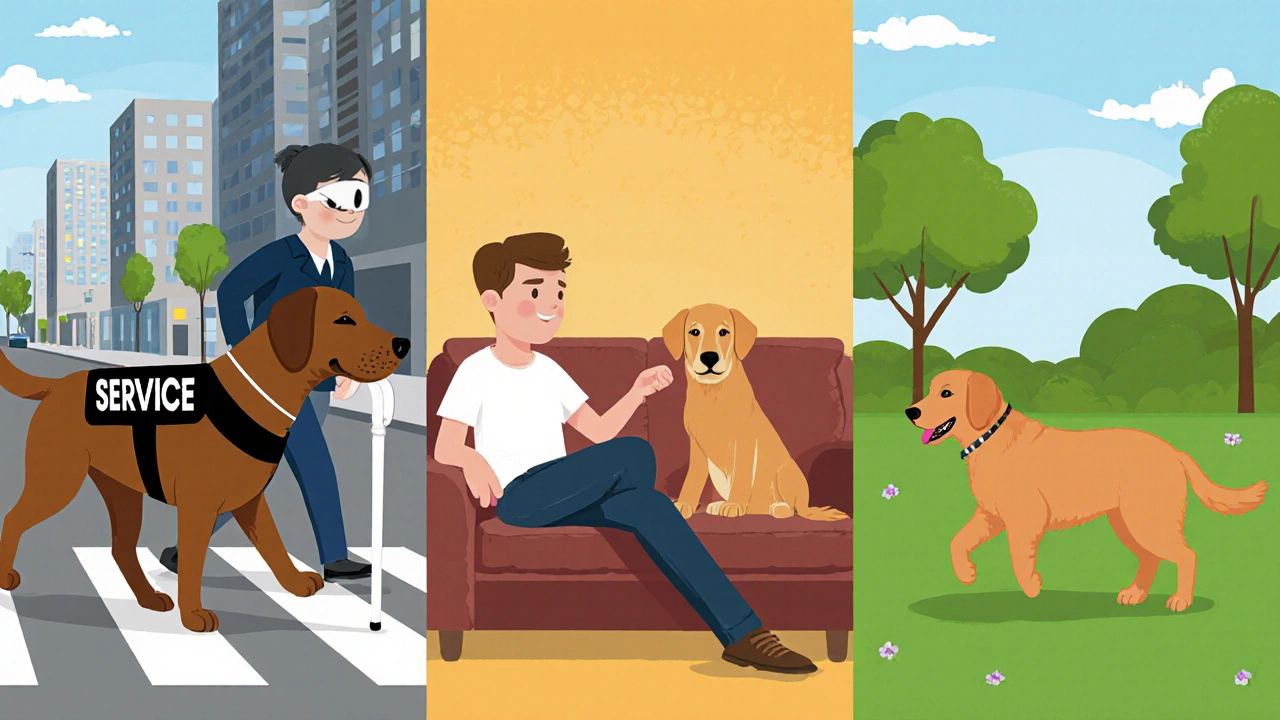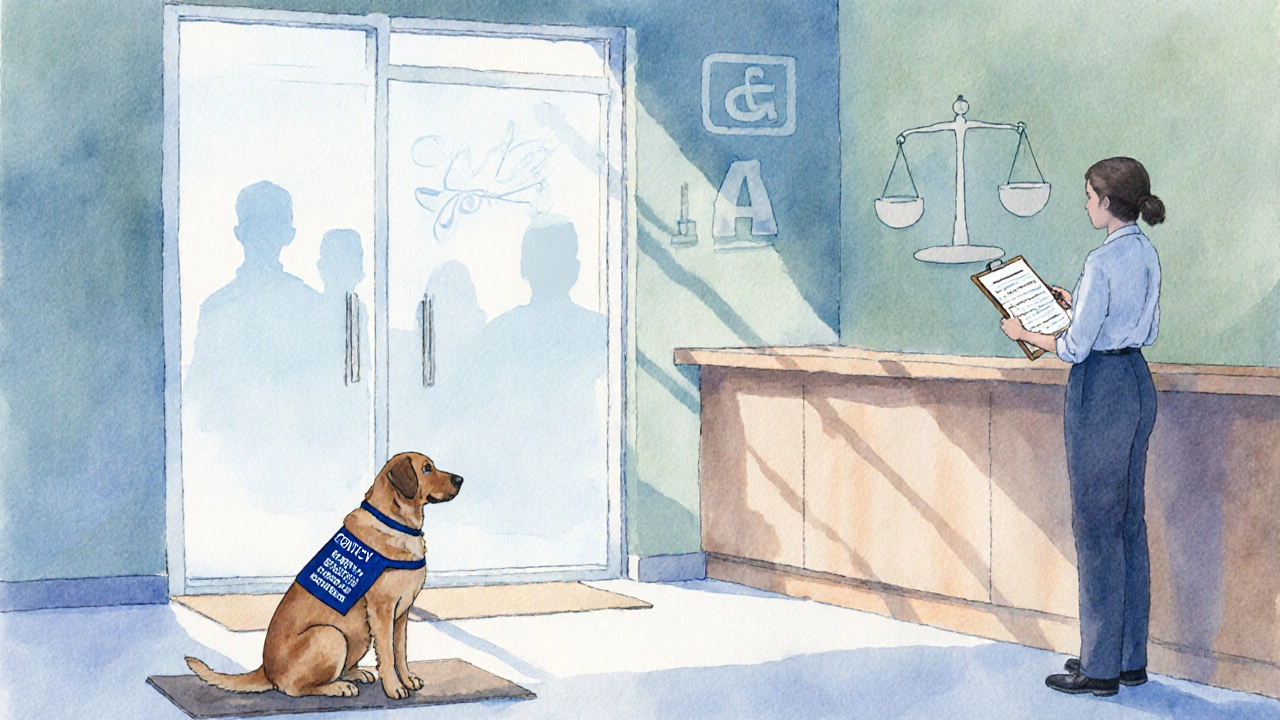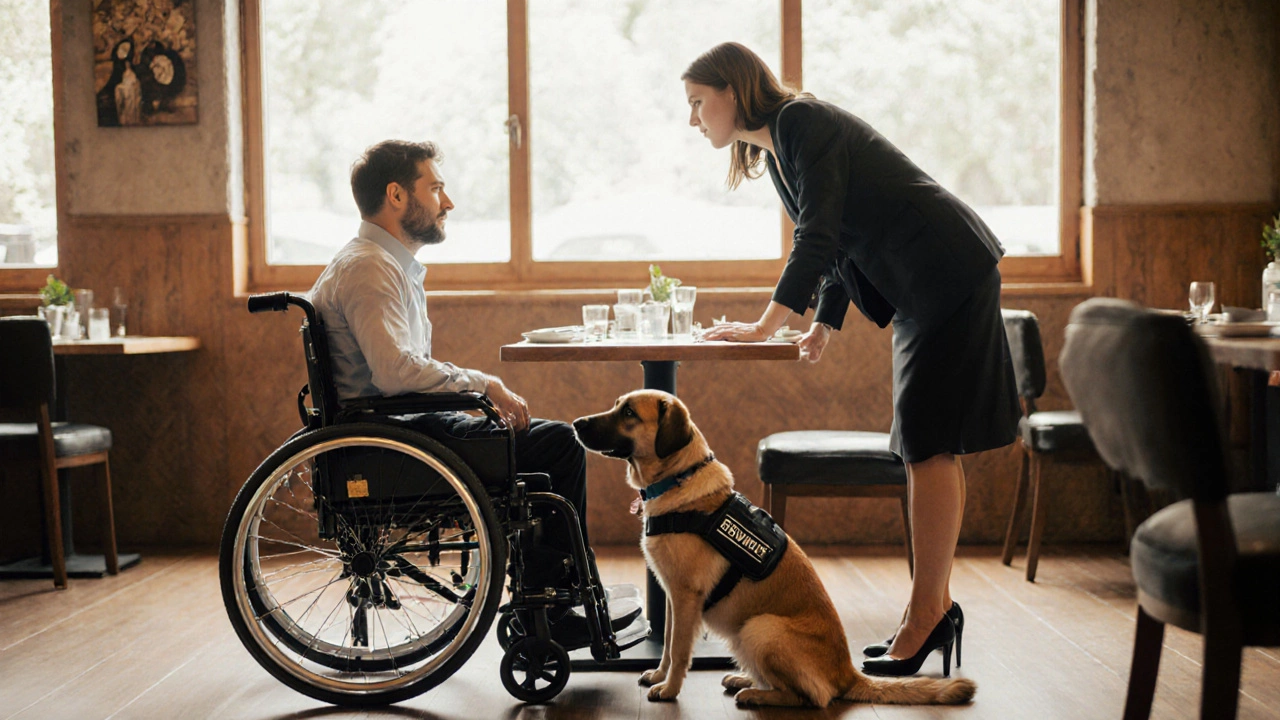Service Dog Question Checker
Check Your Question
Enter a question you might ask about a service dog to see if it's legally acceptable under U.S. ADA or New Zealand laws.
Result
Guidelines
-
USA
ADA Permitted Questions:
- Is the dog a service animal?
- What work or task has the dog been trained to perform?
-
NZ
New Zealand Guidelines:
- Businesses can request evidence of need
- Must not demand unnecessary documentation
- Focus on reasonable accommodation
Key Takeaways
- You can politely ask about a service dog, but the question must follow legal guidelines.
- In the U.S., the ADA allows two specific questions; most other queries are illegal.
- NewZealand’s Disability Act has its own rules, focusing on reasonable accommodation rather than a strict script.
- Always phrase the request respectfully and be prepared for the owner to decline to answer.
- Know the difference between a service dog, an emotional support animal, and a regular pet to avoid misunderstandings.
What a Service Dog Actually Is
When we talk about a service dog is a dog that is individually trained to perform tasks directly related to a person’s disability, we’re referring to a working animal, not a friendly companion. The tasks can range from guiding a blind person to alerting a diabetic of low blood sugar. By law, a service dog must be under the handler’s control at all times and is typically allowed in public spaces where pets are normally barred.
Service Dog vs. Emotional Support Animal vs. Regular Pet
| Feature | Service Dog | Emotional Support Animal (ESA) | Companion Pet |
|---|---|---|---|
| Legal definition | Defined by the ADA (U.S.) and the Disability Act (NZ) | Defined by the Fair Housing Act (U.S.) and similar housing rules in NZ | No specific legal definition |
| Training requirement | Task‑specific, professional training | Basic obedience; no specific task training required | None required |
| Public access rights | Allowed in restaurants, stores, transportation, etc. | Limited to housing and air travel (under certain conditions) | Generally prohibited in public venues |
| Documentation | Not required by law, but owners may carry proof of training | Letter from a licensed mental‑health professional | None |

Legal Landscape in the United States
The Americans with Disabilities Act (ADA) is the cornerstone federal law that protects people who rely on service dogs. Under the ADA, staff may ask only two things:
- “Is the dog a service animal?”
- “What work or task has the dog been trained to perform?”
Anything beyond those two questions-such as asking for the animal’s age, breed, or certification-can be considered discrimination. The law also states that the dog must be under control (leashed, harnessed, or tethered) unless a disability prevents that.
Legal Landscape in NewZealand
NewZealand’s Disability Act 2006 focuses on reasonable accommodation rather than a strict script of questions. Service‑animal owners are protected in most public venues, and business owners can request proof that the animal is needed for a disability, but they cannot demand certificates that are not legally required. The emphasis is on assessing whether the animal’s presence is a reasonable adjustment.
When Is It Okay to Ask?
In practice, the safest moments to ask are:
- When you are a staff member who needs to verify compliance with venue policies (e.g., a restaurant manager).
- When you are a fellow traveler concerned about safety or allergies, and you need to know if the dog’s behavior is predictable.
- When the handler voluntarily offers information about their dog’s tasks.
If you’re just a curious passerby, it’s best to keep the question to yourself. Unsolicited inquiries can feel invasive and may even violate the ADA.
How to Phrase the Question Respectfully
Even if you have a legitimate reason, the wording matters. Here’s a short script you can adapt:
- "Excuse me, I’m responsible for safety here. May I confirm that your dog is a service animal?"
- If the answer is yes, follow with: "Could you tell me what tasks the dog is trained to perform?"
- Thank them and proceed without further probing.
Notice the focus on the animal’s role, not on paperwork or personal health details.

What to Do If You’re the Owner Being Asked
If someone asks you whether your dog is a service dog, you have a few options:
- Provide a brief answer: "Yes, my dog is a service animal trained to retrieve medication."
- If you prefer privacy, you can say: "I’m comfortable with my dog’s role, and the law permits me to be here without additional documentation."
- Know that you can decline to answer any question beyond the two ADA‑allowed ones.
Common Pitfalls and Risks
Even well‑intentioned people can trip up:
- Assuming a dog looks the part. Service dogs come in any breed, size, or color; you can’t tell by appearance alone.
- Pressuring owners for certificates or proof. Those documents are not required by law and demanding them can be discriminatory.
- Sharing personal health information about the handler. The law protects both the animal and the person’s privacy.
- Allowing personal bias (e.g., fear of dogs) to dictate the interaction. Treat every request uniformly.
Quick Checklist for Staff and Business Owners
- Know the two ADA‑permitted questions.
- Train staff on respectful phrasing.
- Display a clear policy on service‑animal access.
- Provide alternative accommodations if a service dog’s behavior poses a genuine safety risk.
- Document any incidents objectively, without recording personal health details.
Frequently Asked Questions
Can I ask a stranger if their dog is a service dog?
Only if you have a legitimate reason (e.g., safety, venue policy). In the U.S., you may ask the two ADA‑approved questions; any additional inquiry can be illegal.
Do I need a certification to prove my dog is a service animal?
No. Federal law does not require certification. Owners can carry voluntary proof, but businesses cannot demand it.
What’s the difference between an emotional support animal and a service dog?
A service dog performs specific tasks for a disability and has public‑access rights. An emotional support animal provides comfort but is not trained for a task and only has housing‑ and travel‑related accommodations.
Can I refuse entry to a place if a service dog misbehaves?
Yes, if the dog is out of control and the handler does not take immediate corrective action, a business may ask the animal to leave.
Are there any NewZealand‑specific rules about asking about service dogs?
NewZealand’s Disability Act permits reasonable accommodation. Businesses can request evidence that the animal is needed, but they cannot ask for unnecessary documentation or for details unrelated to the animal’s function.
